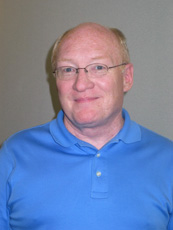 Omahan Jim Cavanagh didn’t think anything about a lump under his arm and doesn’t remember ever hearing the word “lymphoma” before 1999. About six months to a year after he discovered the painless lump, Cavanagh saw his family physician who, in turn, sent him to a surgeon.
Omahan Jim Cavanagh didn’t think anything about a lump under his arm and doesn’t remember ever hearing the word “lymphoma” before 1999. About six months to a year after he discovered the painless lump, Cavanagh saw his family physician who, in turn, sent him to a surgeon.
“It was at that point that it dawned on me, it may be more than a lump,” said Cavanagh, who rarely gets sick. “I only attributed the lump to getting older and fatter.”
The only manifestation of the disease was a lump under one arm, he said, noting he probably should have seen a doctor earlier than he did.
A biopsy diagnosed his lymphoma in February 1999. Cavanagh, who is now in remission, has had an ongoing battle with cancer. He relapsed twice before. Like many cancer patients, he gets anxious about his next check-up.
On Wednesday (Sept. 15), the health field will recognize the first-ever Worldwide Lymphoma Awareness Day with the goals of increasing symptom recognition and early diagnosis and treatment of lymphoma. The event is sponsored by the Lymphoma Research Foundation (LRF), a founding member of the Lymphoma Coalition, a non-profit network organization of worldwide lymphoma patient groups dedicated to raising awareness of lymphoma.
“Lymphoma Awareness Day is a day for citizens to understand the symptoms that might indicate the diagnosis of lymphoma, such as painless swelling of lymph nodes, or unexplained fevers, weight loss, or night sweats,” said Julie Vose, M.D., Neumann M. and Mildred E. Harris Professor and chief, section of hematology and oncology at UNMC. “It is also important to emphasize the increasing numbers of patients affected by lymphoma in the U.S. and the exciting new therapy options for patients based on clinical trials performed at centers such as UNMC.”
As a leader in the Lymphoma Coalition, the Lymphoma Research Foundation (LRF) has enlisted the help of spokespeople for the initiative. Movie and television star, Rob Lowe, is serving as international spokesperson for an event in New York City.
Lymphoma is the most common blood cancer and the third most common cancer of childhood. Lymphoma affects nearly 500,000 Americans. Because lymphoma is the most common of all blood cancers, it is increasingly essential to raise public awareness about the disease and how it affects the lives of all those suffering from it.
The initial diagnosis can be difficult as people can easily mistake its symptoms such as persistent chills, painless swelling of the lymph nodes, fever, night sweats, unexplained weight loss, lack of energy, itching or glandular fever.
As frightening as a cancer diagnosis can be, Cavanagh learned there are many resources for people with lymphoma. He also learned the value of clinical trials and has participated in a clinical trial at UNMC for the past three years.
A clinical trial is a research study that seeks answers to specific health questions and is the fastest and safest way to find new treatments. Study participants gain access to new research treatments before they are widely available.
“The value of clinical trials is huge,” said Cavanagh, a partner in the law firm of Lieben, Whitted, Houghton, Slowiaczek and Cavanagh. “It amazes me what’s being done in the field. I would participate in clinical trials anytime if the medical providers thought there was any potential of learning about this disease and how to manage it better or cure it.”
Cavanagh has learned to live with the fear of cancer, and says living with the disease is probably more difficult for family members than the patient.
“I don’t think about it too much,” he said. “You have to lead your life. I have three children and a wife. You have to take care of life as it is now.
“When you’re told the cancer is back, it intensifies life and relationships. It does make you realize you are more mortal than you thought you were,” Cavanagh said.
Through it all, he said there are two things that come to mind. “I found out how many people are out there who are extremely brave in fighting this disease,” he said. “When you sit in that chair for the IV (intravenous) drip, you also realize how good the medical providers are, particularly the nursing staff. I can’t say enough about the people.”
Patients need to be involved in their medical treatment, he said. “You have to be educated and be on top of what treatment you are getting, right down to knowing which kind of chemo you are getting. I think that’s helpful to you and the medical system,” Cavanagh said.
The clinical cancer program of UNMC and its hospital partner, The Nebraska Medical Center, is recognized as one the most successful and better known centers in the world, known particularly for its expertise in leukemias and lymphomas. About half the clinical and basic research grants awarded to UNMC are cancer-related.
More stem cell/bone marrow transplants for lymphoma are done at UNMC and The Nebraska Medical Center than most institutions in the world.
For information on lymphoma, contact the Lymphoma Research
Foundation at 1(800) 500-9976 or see www.lymphoma.org. For information about lymphoma clinical trials at UNMC, contact Susan Blumel at 402-559-9183 or e-mail sblumel@unmc.edu.